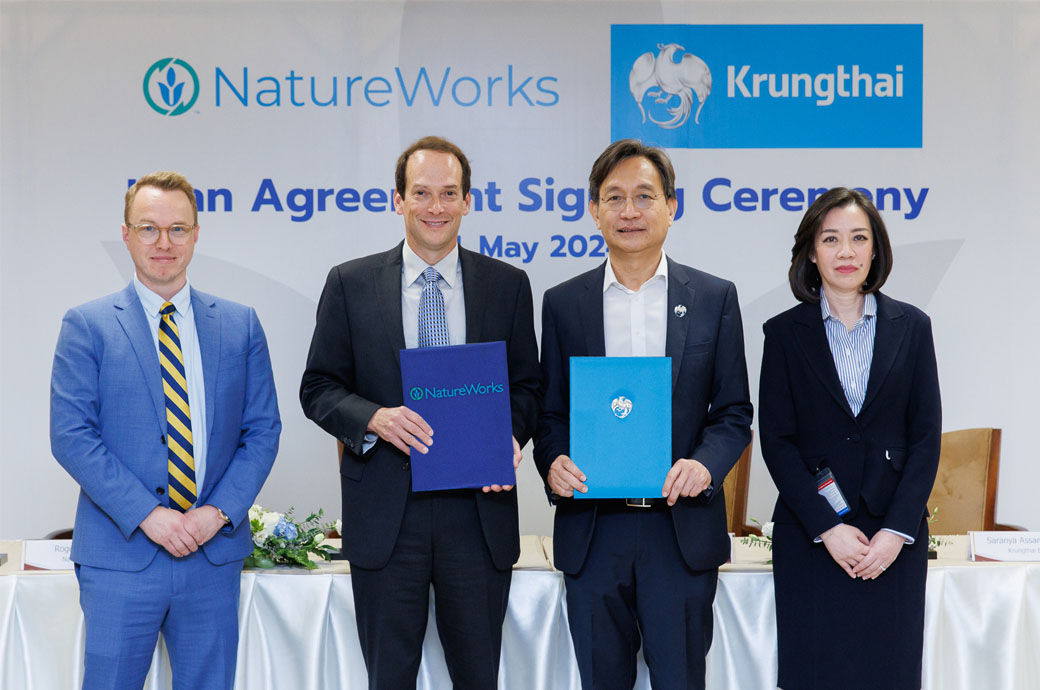
In alignment with its ESG values and sustainable finance solutions, Krungthai Bank funded NatureWorks’ newest manufacturing facility for Ingeo PLA biopolymer, a bio-based material used in plastic and fibre applications. The funding will support the construction of the plant and its ongoing operations. NatureWorks was chosen because of its market leadership in defining bioplastic technologies and how those solutions will move Thailand’s Bio-Circular-Green (BCG) economy forward. BCG leverages technology and Thailand’s biological diversity to enable a more sustainable, innovation-driven, and values-based economy.
“This backing from Krungthai Bank not only validates our strategic global positioning within Thailand and the Asia Pacific region but propels us toward continued expansion to support the worldwide bioeconomy,” said Erik Ripple, president and CEO of NatureWorks. “The funding will enable us to expand our international customer access to fully biobased, low-carbon biomaterials that feature unique performance attributes valued by global downstream packaging and fibre markets.”
NatureWorks’ second facility will be located at the Nakhon Sawan Biocomplex, the first bio-complex in Thailand established in accordance with the BCG Economic Model. The area has a strong agricultural base that can provide an abundant, locally available feedstock in the form of sugarcane. NatureWorks chose the site for its proximity to where sugarcane is grown, with established infrastructure for processing sugarcane into a sugar feedstock for the fermentation process, and the availability of desired utilities, the company said in a press release.
“Thailand is a regional and global leader in driving the development of a global bioeconomy, and commercial banks play a crucial role in driving this transition,” said Suratun Kongton, chief wholesale banking officer of Krungthai Bank. “We’ve provided NatureWorks with financing because it is a world leader in manufacturing biomaterials, meets the requirements to drive our country’s BCG model forward, and aligns with our commitments to address climate change and facilitate the transition to a circular economy. NatureWorks is also creating additional high-value downstream opportunities for existing sugarcane farmers in the Nakhon Sawan region.”
“This investment is monumental for NatureWorks, Cargill, and GC as it moves our joint commitment to environmentally friendly bio-chemicals and biomaterials forward at a time where global demand is increasing,” said Narongsak Jivakanun, NatureWorks board chair, CEO of PTT Global Chemical Public Company Limited (GC). “With this infusion of support from Krungthai Bank, NatureWorks will continue to be a leader in the biomaterials market, pioneering new frontiers for biopolymer applications and advancing biobased solutions across the growing Asia Pacific bioeconomy.”
The new manufacturing facility is designed to be a fully-integrated PLA complex, including production sites for lactic acid, lactide, and polymer. With an annual capacity of 75,000 tons of Ingeo biopolymer, it will produce the full portfolio of Ingeo grades and support the rapid market growth across many markets in the Asia Pacific region, including 3D printing, nonwovens for hygiene, compostable coffee capsules, tea bags, flexible packaging, and compostable food serviceware. Ingeo biopolymers produced at this site will be made from sugarcane sourced from farms within a 50-kilometer radius of the Nakhon Sawan site. Construction is on track to support projected start-up activities and full production in 2025.
Fibre2Fashion News Desk (RR)

